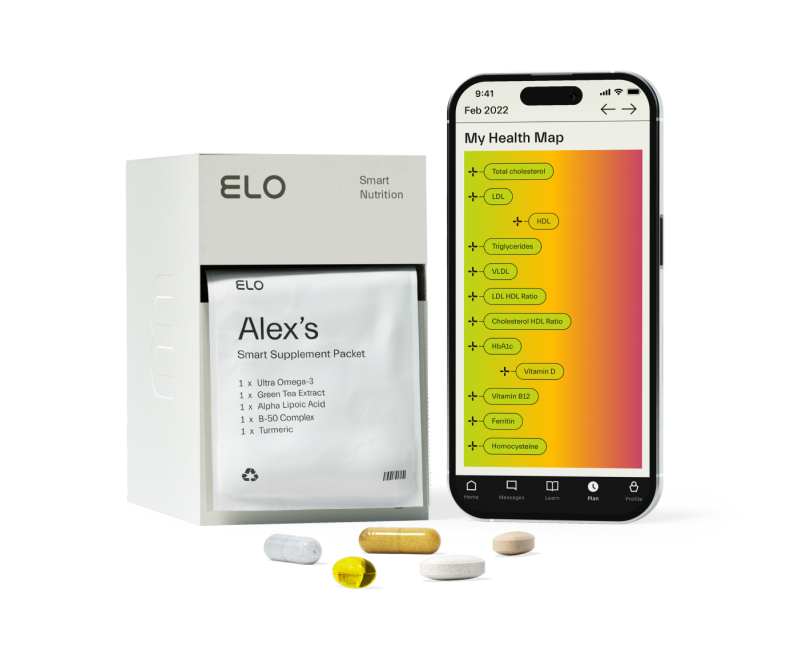What vitamins should not be taken together?
Supplementation can be an effective way to fill any nutrient gaps in your diet, but research indicates that you could do more harm than good if they are taken incorrectly. Here’s what you need to know about what vitamins should not be taken together.

Whether you’re looking to boost energy, achieve glowy skin, balance hormones, or support healthy aging, chances are you’ve turned to supplements to achieve results and enhance your overall health. Supplements are not the end-all-be-all to optimal health and wellness, however, they are a good health insurance policy for bridging any nutritional gaps in your diet.
However, not all supplements are created equal--while some are supported by science, others can negatively interact when taken incorrectly. So, how can you distinguish the good from the bad to determine what (and if) supplements are right for you?
Before we break down the vitamins you shouldn’t take together, let’s first discuss the importance of supplementation and why it can be useful.
Disclaimer: Supplements can have a range of contraindications, and may not be appropriate for everyone. Talk with your doctor or dietitian before adding a new supplement to your routine.
The importance of supplements
Despite your best efforts, you may not get all of the daily nutrients you need from a healthy, well-balanced diet. In fact, surveys show that only 10% and 12% of adults meet the daily fruit and vegetable intake recommendations, respectively, and that over 90% of the US population does not meet the daily requirement for vitamins A, C, D, and E, as well as for magnesium and calcium [ 1 2
That’s why experts suggest that supplementation can be a reasonable solution for filling these nutrient gaps. And while supplements should never replace food, they can effectively treat nutritional deficiencies and bridge any nutrition shortfalls. Additionally, supplements can also benefit certain groups and individuals with certain conditions. For example, research shows that alpha lipoic acid vitamin C 3 4

Get personalized supplements with Elo Health
With so many supplements on the market, it can be hard to sort through the noise to determine which one is right for you. At Elo, we’ve done the work for you – our team of experts have dug into the science to determine the best supplements that will help you reach your health and wellness goals.
We provide personalized smart supplements at-home blood testing biomarkers 1:1 dietitian support with our Elo Health coaches Start your personalized supplement journey today!
Importance of third-party testing
Unlike food, supplement regulation is largely in the hands of manufacturers, and FDA approval for supplements is only required when the product contains a new ingredient.
According to the FDA, every dietary supplement needs to be labeled with the term "dietary supplement" or with a term that substitutes a description of the product's dietary ingredient(s) for the word "dietary" [ 5
That’s why you should always choose a supplement that has been third-party tested to help ensure purity, dosage, and freshness. Learn more about Elo Health’s third-party testing process
It’s also important to note that some supplements may contain ingredients that can interact with medications, so speak with your healthcare provider before starting a new supplement [ 6
What vitamins should not be taken together?
While supplementation can be an effective way to fill any nutrient gaps, there are certain ones that you should avoid taking together. Here are some common ones to watch out for.
Iron + calcium
When taken at the same time, iron calcium 7 vitamin C
Vitamin C + B12
Experts suggest that when taken together, vitamin C could break down vitamin B12 8
Potassium, calcium, zinc, and magnesium
If taken at the same time, large doses of these mineral supplements can compete for absorption and will not be as effective. If you take more than one mineral supplement, take them separately and at least two hours apart.
Green tea extract + iron
Green tea 9
To avoid this, consider taking green tea supplements two hours before or after eating iron-rich foods like meat, poultry, shellfish, beans, tofu, and fortified breakfast cereals.
Multivitamin + calcium, zinc, magnesium, or potassium
Single mineral supplements (including calcium, zinc, and magnesium
For optimal absorption and maximum benefit, take your multivitamin a minimum of 2-3 hours before a calcium, zinc, magnesium, or potassium supplement.
Vitamins D, E + K
Some evidence suggests that moderate to large doses of the fat-soluble vitamins (specifically vitamins D, E, and K) may compete for and reduce absorption when taken together. The absorption of vitamin K seems to be most affected in the presence of other fat-soluble vitamins [ 10
Take these supplements at least two hours apart and with some sort of dietary fat to optimize absorption.
Copper + zinc
Though rare, copper deficiency can result from high levels of zinc, which decreases the body’s ability to absorb and use copper from the diet [ 11
Summary
Supplements can often be touted as the end-all-be-all when it comes to health, but they are not all created equal. While some are supported by science, others can negatively interact when taken incorrectly.
At Elo Health, we determine the right supplements for you based on your biomarkers and wearable data so you can reach your goals and avoid any nutrient interactions. As always, be sure to talk with your healthcare provider before starting a supplement routine or adding certain ones into your regimen.
Disclaimer: The text, images, videos, and other media on this page are provided for informational purposes only and are not intended to treat, diagnose or replace personalized medical care.
Key takeaways
While supplements can effectively treat nutritional deficiencies and bridge any nutrition shortfalls, some can negatively interact with each other when taken incorrectly.
Elo Health provides
personalized smart supplements
made just for you throughat-home blood testing
,biomarkers
, and data from wearables.Smart Supplements have been third-party tested to help ensure purity, dosage and freshness.
References
Centers for Disease Control and Prevention. (2022, January 6). Adults meeting fruit and vegetable intake recommendations - United States, 2019. Centers for Disease Control and Prevention.
https://www.cdc.gov/mmwr/volumes/71/wr/mm7101a1.htm
Micronutrient inadequacies in the US population: An overview. Linus Pauling Institute. (2023, January 3).
https://lpi.oregonstate.edu/mic/micronutrient-inadequacies/overview
Mousavi, S. M., Shab-Bidar, S., Kord-Varkaneh, H., Khorshidi, M., & Djafarian, K. (2019). Effect of alpha-lipoic acid supplementation on lipid profile: A systematic review and meta-analysis of controlled clinical trials. Nutrition (Burbank, Los Angeles County, Calif.), 59, 121–130.
https://doi.org/10.1016/j.nut.2018.08.004
Common colds: Does vitamin C keep you healthy? (n.d.).
https://www.ncbi.nlm.nih.gov/books/NBK279544/
FDA. FDA 101: Dietary supplements. U.S. Food and Drug Administration.
https://www.fda.gov/consumers/consumer-updates/fda-101-dietary-supplements
FDA. Mixing medications and dietary supplements can endanger your health. U.S. Food and Drug Administration.
https://www.fda.gov/consumers/consumer-updates/mixing-medications-and-dietary-supplements-can-endanger-your-health
Lönnerdal B. (2010). Calcium and iron absorption--mechanisms and public health relevance. International journal for vitamin and nutrition research, 80(4-5), 293–299.
https://doi.org/10.1024/0300-9831/a000036
Mayo Foundation for Medical Education and Research. (2023, August 10). Vitamin B-12. Mayo Clinic.
https://www.mayoclinic.org/drugs-supplements-vitamin-b12/art-20363663
Fan F. S. (2016). Iron deficiency anemia due to excessive green tea drinking. Clinical case reports, 4(11), 1053–1056.
https://doi.org/10.1002/ccr3.707
Goncalves, A., Roi, S., Nowicki, M., Dhaussy, A., Huertas, A., Amiot, M.-J., & Reboul, E. (2015). Fat-soluble vitamin intestinal absorption: Absorption sites in the intestine and interactions for absorption. Food Chemistry, 172, 155–160.
https://doi.org/10.1016/j.foodchem.2014.09.021
Munk, D. E., Lund Laursen, T., Teicher Kirk, F., Vilstrup, H., Ala, A., Gormsen, L. C., Ott, P., & Damgaard Sandahl, T. (2022). Effect of oral zinc regimens on human hepatic copper content: A randomized intervention study. Scientific Reports, 12(1).
https://doi.org/10.1038/s41598-022-18872-8







